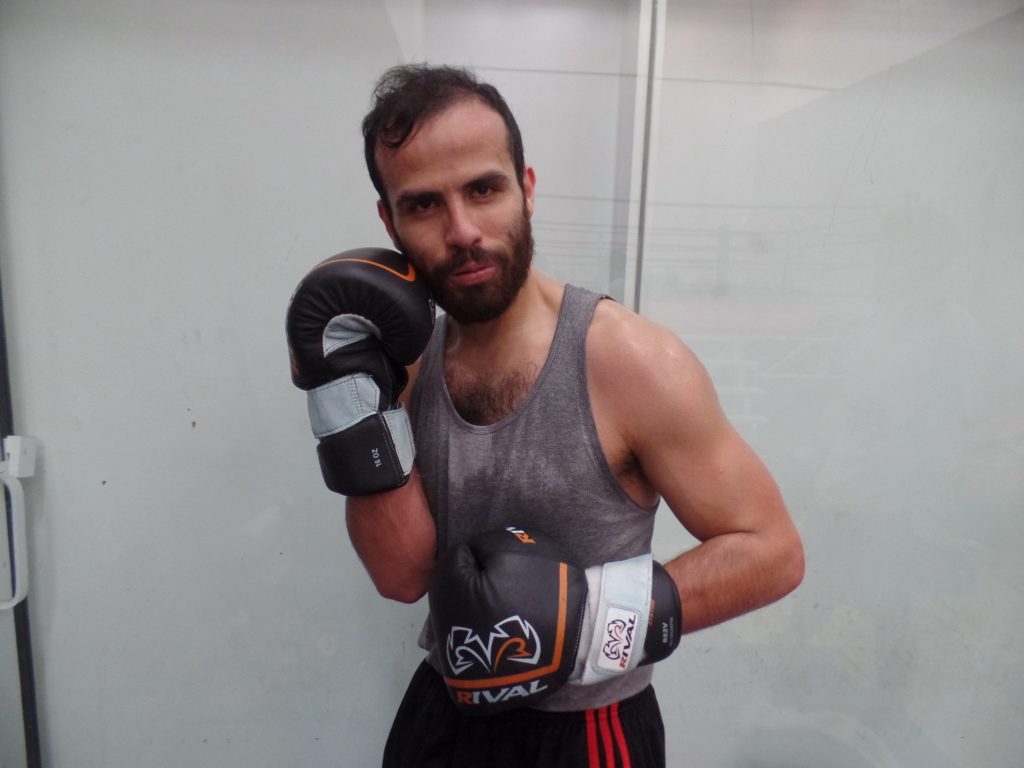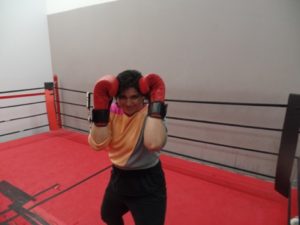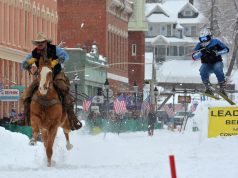
The other guy lands another stinging jab on Israel.
Then, a flattening smack when his glove slams into Israel’s head. Israel crouches low and pulls his gloves tight in front of his face, cheeks and lips bulging from the clench of his mouthguard. The boxers’ teammates and coaches are huddled at opposite corners of the ring tonight at Front Range Boxing Academy in Boulder. The coaches shout instructions, and the timer blares, counting down to the end of the three-minute round.
The timer flashes the orange light, the 30-second bell tolls.
Inside the Front Range Boxing Academy, you feel like you’re in a giant tin can. The air is stale. Everything, each punch, echoes sharply against corrugated metal walls, reverberating through the tunneling space filled with speed bags, heavy bags, weight-lifting machines. The Boxing Academy is located just off the highway, and you probably wouldn’t even notice it, except it’s this rusty yellow smudge on the green landscape. But that doesn’t matter when you’re in the ring.
Israel’s coach, John Dykeman, yells over the flattening smack of another, then another, and another punch, “Quit backing away, dammit!” The problem is that with each punch, Israel surrenders just a little. He steps away and gives the other guy more space to throw a punch, making the other guy’s punch all the more powerful.
So Israel rushes forward, arm arched back, and cannonballs his glove into the guy’s stomach.
“There you go,” John says. “Stay in, stay tight.”
Every couple of weeks or so John and his boxers from the Longmont Athletic Club drive down to Boulder and spar with the Boxing Academy’s team. Sparring isn’t a match. The aim is not to defeat your opponent. This is mutual training, an opportunity for each boxer to practice and sharpen their skills in the ring.
Israel tumbles onto the ropes. John and his boxers back away.

He’s a young guy, maybe mid-20s, lean but hard-wearing. His life is packed with deadlines and squinting at a computer screen. The way he describes it, his life is too mind-heavy. There’s too much of sitting on a swivel desk chair in an office. Israel was an athlete in high school, but stopped working out in college. Then began his office life, and he got pretty out of shape. Growing up, he’d always shared a love of the sweet science with his father, so to lose a little weight, Israel started boxing. And soon he found that it emptied his head of all the work stuff. For nearly three years now, this has been his release.
Outside the ring, there’s the perception that boxing is just unabashed violence. It’s not unusual for people to recoil at swollen eyes or fat lips glistening with Vaseline. Some spectators are exhilarated by the honest ferocity of the sport. Others call it barbarism. But when you’re in the ring, it’s something more than all of that. Maybe you’re Israel, pent up in an office all day. Or maybe you’re one of the many people who’ve written a letter to the Boxing Academy, framed and hanging on the entrance wall, explaining that you started boxing to lose some weight or get more active, but you gained self-esteem, confidence, empowerment. And your life has changed.
The other guy pounds enough space between them again, and throws jab after jab after jab — then the timer blares and flashes red, and the fighting stops. Israel and the other guy hug and plod over to their corners. John waits for Israel with his arms crossed over his black sweatsuit, somber and focused, standing there without saying a word. The other boxers shift in their mesh boots and look at John the same way you look at a reverend or maybe a fortune-teller. John’s short, salt-and-pepper hair is gelled smooth and tidy, and his goatee is something you notice.
“Don’t back out. Period,” Johns says. “No more.” Israel slips under the ropes and nods.
John, 50 now, has boxed since age 10 and trained amateur and professional boxers for decades. He’s also a studied nutritionist who has published several books. Before this, he owned Unleashed Fitness & Training Center, a chain of gyms in San Diego, but after the 2008 stock market crash, he lost three of his four gyms. John’s girlfriend lived in Colorado at the time; her father owns the Longmont Athletic Club. She encouraged John to move and make a new start. “My girlfriend said, ‘Are you happy?’ And I said, ‘No, you know, half my boxers are gone,’” John recalls. “I was depressed.” So he moved to Colorado and joined the staff of the Longmont Athletic Club, where he’s established a flourishing boxing program.
John’s boxers have to do more than pound the heavy bag and lift weights. They have to eat right, they have to sleep right. If his boxers don’t sleep enough, John notices it in their stamina, and says they won’t last in the ring like that. His training emphasizes “multiple facets,” drawing especially on his work as a nutritionist. It’s not the kind of singularly focused sports training that strengthens athletes in one way and leaves them vulnerable in others. “It’s really just the approach, it’s the facts, it’s the fundamentals of what we have to do as human beings,” he says. John has formulated a tiered eating plan for each of his boxers, beginning with an optimal diet. And when you ask them if all of this — the diet, more sleep, the vigorous pugilist lifestyle — has improved their lives outside the ring, they’ll tell you yes. “This isn’t just about learning how to box. It’s learning how to approach life,” John says. “It’s learning how to be excellent every day.”
Monica is the only woman on John’s team, the only woman here tonight, and she waits calmly for her turn to get in the ring. She only started boxing about two years ago. Her first semester at Colorado State University had just ended, and Monica flew home to see her mother, who was undergoing treatment for breast cancer. Despite the four years the doctors said she had left, her mother passed away on that visit.
After the funeral, Monica returned to CSU and failed most of her classes. She had no family in Colorado, and few friends. Monica joined a grief group. She joined a trail-building group too, constructing hiking and city trails. She needed something to do, some task or purpose to let her move past her grief. She continued with the grief group, but left the trail-building group after sharing her mother’s death with the crew leader, who asked if Monica ever receives phone calls with no one on the other line, as that might be her dead mother.
“I was sad for six months and then I emerged from that and I was like, ‘Wow, I am furious,’” she says. Monica changed majors and decided to fight. An avid fan of televised boxing, she looked for the nearest place to get in the ring herself, and that’s how Monica met John. At first, she thought it might be weird to join a team of men, but they welcomed her enthusiastically. Sure, the other boxers call her “sweetie,” but she thinks it’s endearing.
When Monica gets in the ring tonight, before the round begins, you see her up there across from a man and you’re a little nervous. You see this woman in a baggy gray tank top, her leg twitching just a little as she presses her boots down on the mat and stares into her opponent. Your nerves keep wracking until the timer blares and the green light flashes and the round starts. And when you see her throw those punches, the fierce way she endures up there, well, you know there’s just nothing to worry about.
When Monica gets out of the ring she’s glossy with sweat, and says she has a slight headache. She has a bit of a weak chin, meaning her head is a little sensitive. “But it was totally worth it,” she says. It’s not just her mother’s death that she’s coping with up there. Monica has also struggled with thoughts of suicide much of her life. But in the ring, she’s absorbed only by survival. “It’s such a high-stress situation that you don’t have room for that in your mind,” she says. “It’s like tranquility.”

Dave Gaudette owns the Front Range Boxing Academy, and coaches the other team tonight. Leaning against a post on the other side of the ring, he looks like a guy who once had a body cast out of molten iron, but now he’s grizzled and a little tired and doesn’t punch like he used to. Dave first started training and boxing as an amateur in New England. He won the New Hampshire Amateur Lightweight Championship title in 1969, and was the Southern New England Amateur Junior Welterweight Champion in 1971. Then he moved to Colorado and tried to turn pro, but at the time there was no boxing commission or professional fighting, and few promoters. So Dave became a “bohemian graduate student” in philosophy. He worked odd jobs for years before opening Front Range Boxing Academy in 1994.
Tonight, for the first time in three months, Henry spars on Dave’s team. Henry’s a student at CU Boulder, but he’s been on hiatus to get his life together. Picture Dave as a young man — that’s how Henry looks. And tonight, pacing back and forth, looking up at the boxers in the ring, looking down at the floor, Henry’s buzzing. He asks Dave if he can get in the ring, and Dave clears his throat to yell over to John in a raspy northeastern drawl. John surveys his boxers and tells his biggest guy, Brandon, to get ready.
Once the green light flashes, the boxers don’t shuffle on their feet. Henry, he doesn’t try to size the other guy up. You get the feeling that it doesn’t really matter what the other guy can do. Not to Henry, anyway. The timer blares, and Henry lunges at Brandon and bashes his head, bashes him with arms like cudgels until Brandon shrinks up under the hail storm of punches, and Dave yells, “Henry, you’re going too fucking hard, man!” and the round stops.
“Relax,” Dave says. “Don’t try to take his head off.”
Henry nods and says sorry to Dave and Brandon. But when the round resumes, it’s like Henry goes into a trance the second the timer blares. He bashes Brandon with the same wild intensity, and Dave stops the round again and says that’s enough. He pulls Henry out of the ring and tells him, “You don’t realize your own strength.”
After sparring finishes for the night, Henry introduces himself to Brandon. They haven’t met before, and Henry apologizes again. The two of them shake hands and agree to spar again next time. Many of these guys will tell you it’s good fun to fight your friends, and then go out for a beer. “Henry has gifts,” Dave says. “He’s genetically gifted. He grew up in a tough neighborhood, and he learned how to scrap.” But Henry needs to learn how to control and focus his power. He needs to learn the skill and technique that will make that power effective in a 12-round bout.
When you’re in the ring, in some way you’re really trying to figure out how to live. The fight just provides the context for people to test and demonstrate their power. Boxers learn when to duck, when to punch back. They learn how long they can sustain themselves. Henry, he fights like a guy who wants to pummel the world. Monica fights like someone who just needs to know she’s going to survive. Israel is in there to experience some adventure before slogging back to the office. You always bring your whole life into the ring.
“Sometimes they’re in here fighting their fathers or their mothers,” Dave says, lounging on a wooden stool while everyone changes out of their boxing garb. He points to his head and says, “I mean up here.” Dave says prizefighters are the nicest people he’s known. After people get out of the ring, they go back to the world with a sense of peace. “It makes it much easier not to fight. Number one, you don’t have anything to prove, because you prove it in here. And you don’t have the instinct,” Dave says. “The instinct is at least temporarily sublimated. For me, it was sublimated completely.”
Before Henry leaves for the night Dave tells him, “If you just stick to your aggression, you can’t learn the other kind of stuff you need.”
“Yes, coach,” Henry says. “See you tomorrow.”
Dave says goodnight and leaves it at that, even if it doesn’t seem like Henry appreciates the wisdom yet. But Dave says he will learn eventually. A lot of fighters get in the ring and just try to pummel the world. Eventually, though, someone else comes along and levels them. Then they understand that they have to grow. Other people get in the ring, and they don’t think they can do anything. These people often reveal power that had been unknown to them.
“It makes the proud humble, and the humble proud,” Dave says.

Monica won’t fight for the rest of her life. She says she doesn’t want her brain to turn to juice. “But for the rest of my life,” she says, “I’m going to know if I work really hard at something, I could probably do it.” Everyone tells a different story. They all have their own purpose for being here. But the ring is always the same place. With the timer counting down and every punch echoing huge, with blood and sweat, you’re in there to claim your life. And when you’re finished, well, it’s like John says: “Once you get through that, you get out of that ring and you’re like, ‘Holy shit, life is easy.’”














